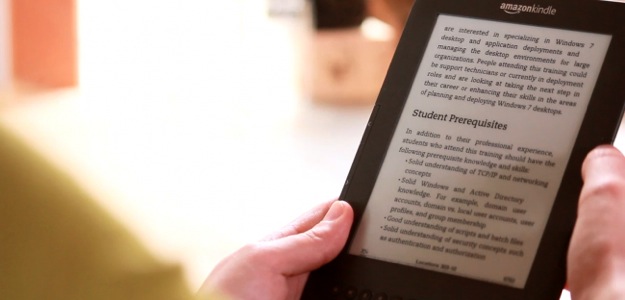 As a Kindle user, I admit that I am surprised by how quickly I’ve become used to reading longform content on a screen. Before using it, I was reticent because, hey, I like physical books and couldn’t imagine my eyes not feeling strained after staring at the stark black type on a white screen. That turned out not to be the case, and instead I quickly became a convert. I could buy books with nary a thought and carry them around with equal ease! Why would I ever give this kind of freedom up?
As a Kindle user, I admit that I am surprised by how quickly I’ve become used to reading longform content on a screen. Before using it, I was reticent because, hey, I like physical books and couldn’t imagine my eyes not feeling strained after staring at the stark black type on a white screen. That turned out not to be the case, and instead I quickly became a convert. I could buy books with nary a thought and carry them around with equal ease! Why would I ever give this kind of freedom up?
That seems to be the same question a bookseller in Australia is trying to find an answer for after having decided that enough is enough, and it’s time to stand up to the Kindle menace. Pages & Pages, one of the country’s leading independent booksellers, announced last Friday that it would (until further notice) offer a “Kindle Amnesty” on the third Saturday of every month, where customers can exchange their Kindles for a gift voucher for the store worth $50 Australian dollars.
Jon Page, manager of Pages & Pages (and also the president of the Australian Booksellers Association), said that his store “is no longer sitting passively by while Amazon steals out customers and steals their reading choices.” He continued, “Through this campaign we want people to understand what Amazon is doing and make an informed choice to have choice.”
Despite what the Kindle Amnesty may look like, it turns out that this isn’t any digital e-readers. “The e-book is not a threat to physical bookshops,” Page said. “This new format presents bookshops and readers with many wonderful opportunities to sell and read more books. What does threaten bookshops is a company who engages in uncompetitive behavior, pays no tax in Australia and misleads readers with restrictive devices and fake book reviews.”
Warming to his theme of Amazon’s inherent wrongness, Page describes the Amazon model as walling readers into a “garden,” restricting customers from a freedom of choice. “Pages & Pages Booksellers… also sells e-books and e-readers. We also support local schools, pay taxes in Australia, employ local people, give Mosman Village character [and] respect readers’ privacy. None of which Amazon does.”
Is all of this as much an advertisement for Page’s store as a point of principle? That may not have been in doubt considering the gift voucher exchange program at the center of everything, but what makes this an interesting topic is that Page is merely taking advantage of growing local disquiet over international online entities like Amazon and Google, as opposed to originating it. When will someone take on Amazon without promoting its own sales stunt?
Editors' Recommendations
- Best Kindle deals: Get Kindle Unlimited for free
- The best Kindle for reading outside, at night, and more
- How to share Kindle books with family and friends
- Amazon Kindle vs. Kindle Paperwhite: don’t buy the wrong e-reader
- Amazon Kindle Oasis vs. Kindle Paperwhite: don’t buy the wrong one


